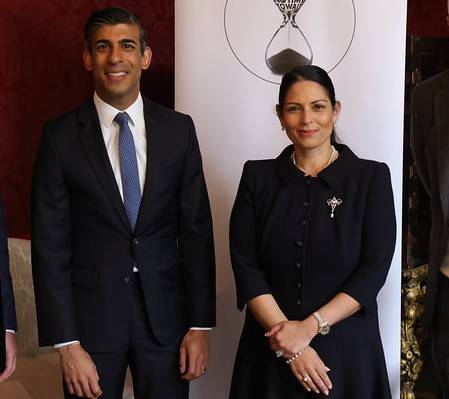Earlier on Tuesday, Truss was invited by the British monarch Queen Elizabeth II to head the UK’s government after she won a leadership contest in the ruling Conservative party on Monday…reports Asian Lite News
As a first major step, Britain’s new Prime Minister Elizabeth Truss, the third woman to be at the apex of a British government, could freeze household energy bills at their current level for about 18 months to tackle the severe cost of living crisis that has gripped the country. Financial Times estimated such an intervention could cost the British Treasury 100 billion pounds.
The Guardian newspaper maintained Truss will pack her cabinet with loyalists and there was unlikely to be any place in it for her defeated opponent in the 8-week race for the premiership Rishi Sunak, who is of Indian extraction. It reported that Kwasi Kwarteng could replace him as Chancellor of the Exchequer. Meanwhile, Sunak extended his ‘full support’ to Truss.
The Bank of England, the United Kingdom’s central bank, had forecast about the month ago that the British economy would sink into recession in the next quarter and remain in such a condition for five consecutive quarters. The proposed subsidy, while welcome for Britons wilting under extraordinary energy prices, will impose a further burden on the government’s finances.
Furthermore, it indicated that Home Secretary Priti Patel was destined to be banished to the back benches, with another person of Indian origin Suella Braverman filling her post. With James Cleverly tipped to become Foreign Secretary — a position Truss occupied — only Ben Wallace, the Defence Secretary, could retain his portfolio among the top four ‘great offices of state’. It remains to be seen if Alok Sharma retains a presence in the cabinet.
Earlier on Tuesday, Truss was invited by the British monarch Queen Elizabeth II to head the UK’s government after she won a leadership contest in the ruling Conservative party on Monday.
The day of constitutional formalities began on Tuesday with Boris Johnson finally leaving 10 Downing Street, the office-cum-residence of a British prime minister, after he was forced to resign following being fined by the London Metropolitan Police for attending social gatherings in violation of rules during a Covid lockdown period. He was also accused of misleading parliament on the issue, which is traditionally a sackable offence in the UK.
However, in a farewell speech outside the door of Number 10, he described himself as a ‘booster rocket’ which had ‘fulfilled its function’, before flying to Balmoral Castle in Scotland, where Elizabeth, 96, is presently in residence, to submit his resignation. Normally she grants audiences for such purposes at Buckingham Palace in London; but could not make the trip down to the British capital because she now suffers from ‘episodic mobility issues’.
Johnson journey was followed by Truss separately undertaking the same trip to be formally asked by Britain’s head of state to form the next administration.
The process completed a remarkable exhibition of revolving door politics, with Truss becoming the UK’s fourth prime minister in six years.
The instability began in June 2016 with David Cameron stepping down after he lost the Brexit vote.
He was succeeded by Theresa May, Britain’s second woman prime minister after Margaret Thatcher, until she was ousted by her MPs and Johnson took over the reins.

Leave a Reply